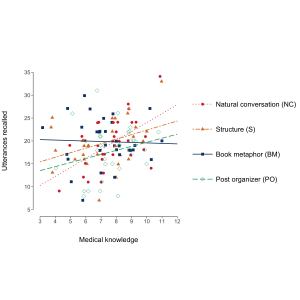
We investigated the effects of information structuring and its potential interaction with pre-existing medical knowledge on recall in simulated discharge communications. Specifically, we asked students to view a set of well-controlled videos of a simulated discharge communication filmed from the point-of-view of a patient (the videos and data are available for download on OSF). Our goal was to investigate whether different ways of structuring information could provide differential memory benefits.
For this purpose, we randomly assigned our proxy-patients to one of four conditions: A natural conversation (NC) condition, that was not explicitly structured, a structure (S) condition that presented information organized by topics, and a book metaphor (BM) and post organizer (PO) conditions that also presented information structured by topics but, in addition, included a synopsis, either at the beginning or at the end of discharge communication, respectively. We assessed proxy-patients’ recall, perception of communication quality, and the students’ pre-existing medical knowledge.
The main results were that we did not find an overall difference in recall between the conditions, albeit in comparison to the natural conversation (i.e., unstructured) condition, proxy-patients in all information structuring conditions (S, BM, PO) more strongly recommended the physician to family and friends. More interestingly, we found an interaction between pre-existing medical knowledge and recall in the structured Book Methaphor (BM) condition (see figure below). This suggests that structured discharge communication complemented by the initial synopsis may be particularly beneficial to individuals with lower pre-existing medical knowledge.
Siegrist, V., Langewitz, W., Mata, R., Maiori, D., Hertwig, R., & Bingisser, R. (2018). The influence of information structuring and health literacy on recall and satisfaction in a simulated discharge communication. Patient Education and Counseling. https://doi.org/10.1016/j.pec.2018.08.008

Be the first to leave a comment. Don’t be shy.